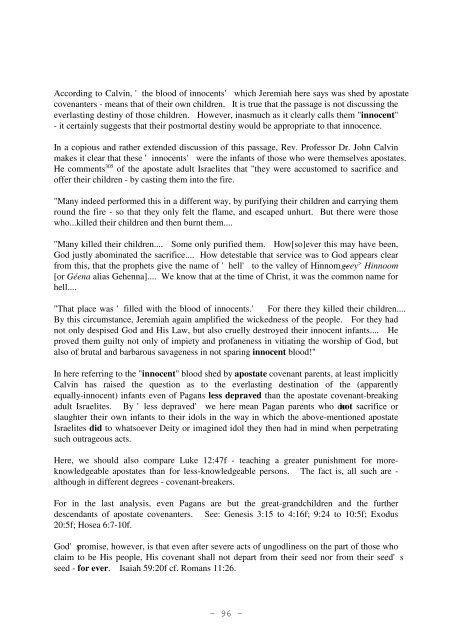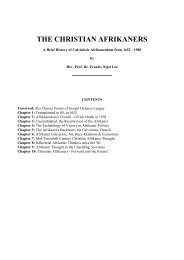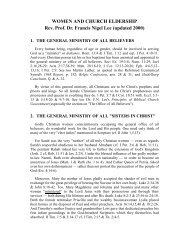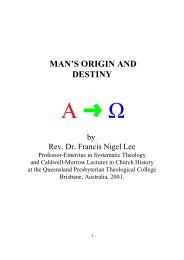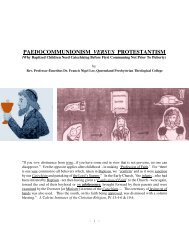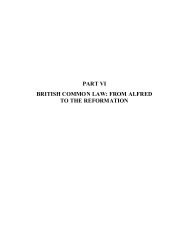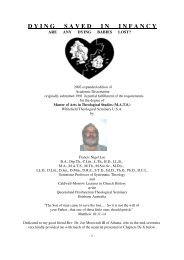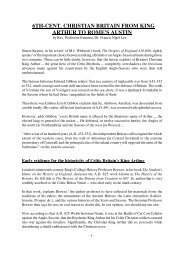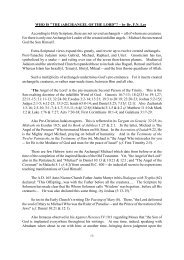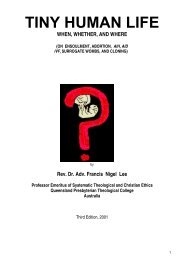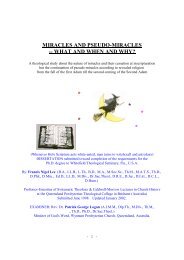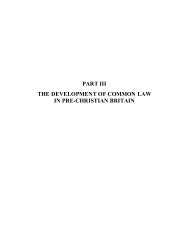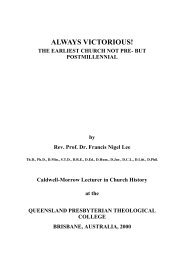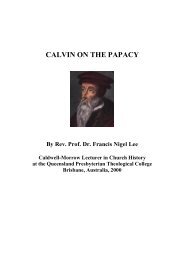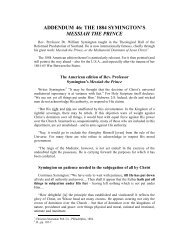VII. JOHN CALVIN ON THE SALVATION OF - The Works of F. N. Lee
VII. JOHN CALVIN ON THE SALVATION OF - The Works of F. N. Lee
VII. JOHN CALVIN ON THE SALVATION OF - The Works of F. N. Lee
You also want an ePaper? Increase the reach of your titles
YUMPU automatically turns print PDFs into web optimized ePapers that Google loves.
According to Calvin, ' the blood <strong>of</strong> innocents' which Jeremiah here says was shed by apostate<br />
covenanters - means that <strong>of</strong> their own children. It is true that the passage is not discussing the<br />
everlasting destiny <strong>of</strong> those children. However, inasmuch as it clearly calls them "innocent"<br />
- it certainly suggests that their postmortal destiny would be appropriate to that innocence.<br />
In a copious and rather extended discussion <strong>of</strong> this passage, Rev. Pr<strong>of</strong>essor Dr. John Calvin<br />
makes it clear that these ' innocents' were the infants <strong>of</strong> those who were themselves apostates.<br />
He comments 305 <strong>of</strong> the apostate adult Israelites that "they were accustomed to sacrifice and<br />
<strong>of</strong>fer their children - by casting them into the fire.<br />
"Many indeed performed this in a different way, by purifying their children and carrying them<br />
round the fire - so that they only felt the flame, and escaped unhurt. But there were those<br />
who...killed their children and then burnt them....<br />
"Many killed their children.... Some only purified them. How[so]ever this may have been,<br />
God justly abominated the sacrifice.... How detestable that service was to God appears clear<br />
from this, that the prophets give the name <strong>of</strong> ' hell' to the valley <strong>of</strong> Hinnomgeey --<br />
> Hinnoom<br />
[or Géena alias Gehenna].... We know that at the time <strong>of</strong> Christ, it was the common name for<br />
hell....<br />
"That place was ' filled with the blood <strong>of</strong> innocents.' For there they killed their children....<br />
By this circumstance, Jeremiah again amplified the wickedness <strong>of</strong> the people. For they had<br />
not only despised God and His Law, but also cruelly destroyed their innocent infants.... He<br />
proved them guilty not only <strong>of</strong> impiety and pr<strong>of</strong>aneness in vitiating the worship <strong>of</strong> God, but<br />
also <strong>of</strong> brutal and barbarous savageness in not sparing innocent blood!"<br />
In here referring to the "innocent" blood shed by apostate covenant parents, at least implicitly<br />
Calvin has raised the question as to the everlasting destination <strong>of</strong> the (apparently<br />
equally-innocent) infants even <strong>of</strong> Pagans less depraved than the apostate covenant-breaking<br />
adult Israelites. By ' less depraved' we here mean Pagan parents who do not sacrifice or<br />
slaughter their own infants to their idols in the way in which the above-mentioned apostate<br />
Israelites did to whatsoever Deity or imagined idol they then had in mind when perpetrating<br />
such outrageous acts.<br />
Here, we should also compare Luke 12:47f - teaching a greater punishment for moreknowledgeable<br />
apostates than for less-knowledgeable persons. <strong>The</strong> fact is, all such are -<br />
although in different degrees - covenant-breakers.<br />
For in the last analysis, even Pagans are but the great-grandchildren and the further<br />
descendants <strong>of</strong> apostate covenanters. See: Genesis 3:15 to 4:16f; 9:24 to 10:5f; Exodus<br />
20:5f; Hosea 6:7-10f.<br />
God' s<br />
promise, however, is that even after severe acts <strong>of</strong> ungodliness on the part <strong>of</strong> those who<br />
claim to be His people, His covenant shall not depart from their seed nor from their seed' s<br />
seed - for ever. Isaiah 59:20f cf. Romans 11:26.<br />
- 96 -


